Barry Forshaw, author of the new Crime Fiction: A Reader’s Guide, points us towards some important entries in the hottest of current crime genres…
Author and journalist Barry Forshaw is one of the UK’s leading authorities on crime fiction, and has written a bookshelf worth of guides to the genre, covering both in print and on the big screen. His latest is Crime Fiction: A Reader’s Guide and inside you’ll find chapters that comprehensively cover all the key authors you should be reading. It’s an unmissable tome, full of detail and insight, and to celebrate its launch Barry has zeroed in on one corner of the genre for us, selecting the best of domestic noir. We hand the mic to Barry…
At the time of writing, it’s easy to discern what is the genre du jour: domestic noir. It may be a contemporary genre, but its principal antecedent in narrative terms – a woman marries a man who may be a murderer – is Daphne du Maurier’s Rebecca (1938). When the writer Julia Crouch coined the term for work including her own books, such as Her Husband’s Lover (2016) and SJ Watson’s Before I Go to Sleep (2011), she was identifying what had become a clearly delineated field in the second decade of the 21st century. As Crouch put it: ‘Domestic noir concerns itself largely (but not exclusively) with the female experience, is based around relationships and takes as its base a broadly feminist view that the domestic sphere is a challenging and sometimes dangerous prospect for its inhabitants.’ Lately, the genre has taken a distinctly predictable turn, with the male sex invariably the repository of all that is dangerous and duplicitous. But perspicacious crime writers are no fools – they are well aware that their trade is cyclical. Readers will eagerly consume a new variation, but will tire of it if it is overused. And the evidence is that British crime writers are always keen to move on and to innovate – when they are obliged to.
Her Husband’s Lover by Julia Crouch (2016)
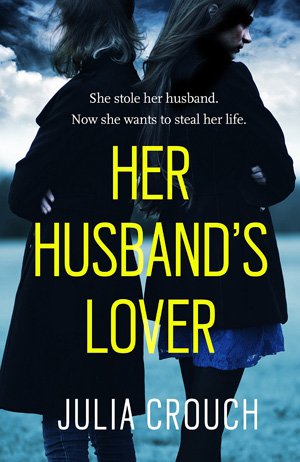
As mentioned above, Julia Crouch christened the domestic noir genre, so it’s hardly surprising that she is one of the most adroit practitioners of the genre – in which marriage is a minefield and sexual betrayal is the order of the day. Louisa survives a car crash, but her husband Sam and children are killed. The eponymous husband’s lover is Sophie. Louisa is convinced that her late husband was prepared to exact terrible revenge if she ever left him, but Sophie defends his reputation – not, however, without self-interest. Sam is dead, but she feels that his house and his money really belong to her. The reader is constantly – and satisfyingly – wrong-footed when deciding which of the two women they should place their sympathy with. Some may find the book’s considerable length daunting, but Crouch largely justifies the nearly 500 pages, proving that the domestic noir genre is safe in her hands. Read the CFL review here.
Buy now on Amazon
Apple Tree Yard by Louise Doughty (2013)
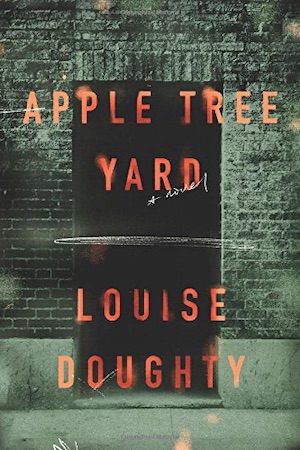
Louise Doughty is the author of some very different (and challenging) novels tackling a wide variety of subjects, including Apple Tree Yard, which was nominated for many prizes, translated into over 20 languages and adapted with great acclaim for television. Yvonne Carmichael has achieved considerable success in the field of genetics, and has a strong relationship with her husband and their two adult children. But an encounter with a stranger at the Houses of Parliament leads from a passionate, clandestine series of sexual trysts to Yvonne risking everything of value in her life, and finally to betrayal and murder. Doughty’s other novels include Black Water (2016) and Whatever You Love (2010), which was shortlisted for the Costa Novel award and longlisted for the Orange Prize for Fiction. She has won awards for radio drama and short stories, along with publishing one work of non-fiction, A Novel in a Year (2007), based on her newspaper column. Read the CFL review here.
Buy now on Amazon
Our Kind of Cruelty by Araminta Hall (2018)
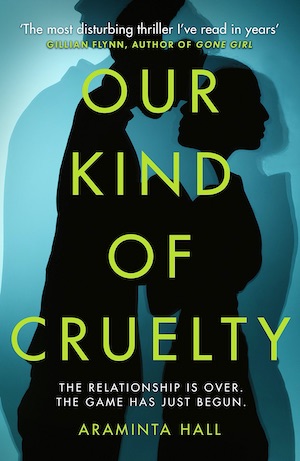
Sexual role playing games – in Araminta Hall’s impressive novel – have dangerous undercurrents. Privileged London couple Mike and Verity have a clandestine erotic strategy called ‘the crave’, in which Verity allows herself to be semi-seduced in a bar in order that Mike can appear at a crucial moment and rescue her, a charade that both find highly erotic. But when Verity opts to marry another man, Mike decides that this is the game taken to another level, and what follows has disastrous consequences for both.
Hall’s considerable achievement with Our Kind of Cruelty is to keep the narrative persuasively within Mike’s consciousness – and we learn that he is deeply damaged by an abusive childhood. The accumulating tension of the novel leads to a high-profile trial in which both protagonists are in the dock. While the orchestration of suspense is masterly, Hall’s real agenda becomes apparent in a feminist subtext: the way in which active female sexuality is judged more harshly in modern society than male desire… although nowadays the latter is receiving criticism too.
Buy now on Amazon
The Girl on the Train by Paula Hawkins (2015)
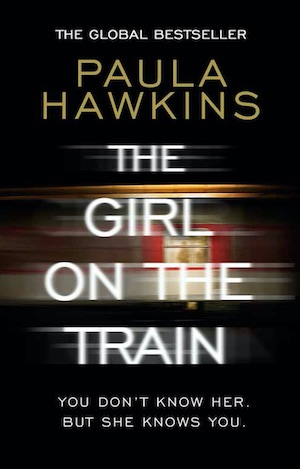
How do you capture lightning in a bottle? It’s a trick that publishers are customarily desperate to pull off, and when it happens – as, for instance, with the massive success of Gillian Flynn’s Gone Girl (2012) – it engenders great excitement and considerable envy in the book world, with editors casting around ever more desperately for the next breakout book. That book wasn’t long in coming. When Paula Hawkins’ The Girl on the Train first appeared, response from the critical fraternity was muted but favourable, with admiration expressed for the solid storytelling alongside wry observations on the central theme being cheekily borrowed from Alfred Hitchcock’s Rear Window. The premise of the plot – the half-observed murder with a witness who is not believed – is, of course, one of the most familiar in the history of the cinema, and one that has been paid homage to innumerable times in such books as The Woman in the Window (the 2018 novel by AJ Finn rather than the vintage Fritz Lang film from 1944) as well as Hawkins’ The Girl on the Train. The book became a prodigious, all-conquering bestseller, with the inevitable film adaptation adding more lustre to Hawkins’ reputation and bank balance. Read the CFL review here.
Buy now on Amazon
Bitter by Francesca Jakobi (2018)
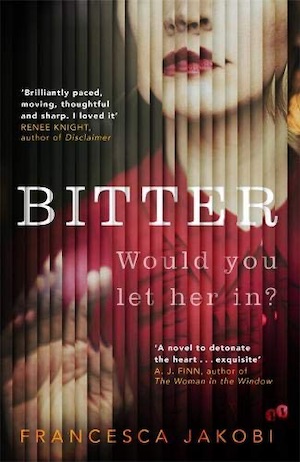
Francesca Jakobi’s provocative Bitter is a reminder that the crime fiction genre is nothing if not gender-neutral when it comes to stalkers. Gilda Meyer was dispatched from a well-heeled German Jewish background to an English boarding school when the Nazis came to power; now, in 1969, she is a middle-aged woman on the brink of bringing chaos into her own life and that of her newly married son, Reuben. She resents her attractive new daughter-in-law for stealing her son’s love, something that Reuben never showed her. The results are as hilarious as they are unsettling as Jakobi exploits the stereotype of the needy Jewish mother and we are drawn against our better judgement to side with the out-of-control Gilda.
Buy now on Amazon
Also see Barry Forshaw’s expert guides to historical crime fiction, Nordic noir and crime fiction in the noughties on our site.
